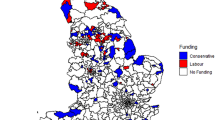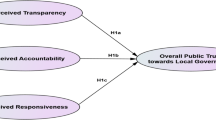Abstract
Scandals that hit political institutions and their actors are likely to contribute to lowering political trust. However, few studies examine the accuracy of such relationship at the local level. This article aims to contribute to the field by assessing the impact of local scandals on trust in local government and the mayor in the context of a federal state, Belgium. The research relies on an original dataset that includes a selection of municipalities that were hit by a scandal and of municipalities that were not in the running-up of the 2018 local elections. Our findings suggest the existence of a ‘scandal effect’ on voters’ trust in local government and mayor. First, trust in local institutions appears significantly lower in municipalities that were hit by a scandal. Second, the effect of scandals at the individual level appears to be reinforced by voters’ perception of trustworthiness of local politicians: scandals more significantly affect trust in local government among voters who evaluate negatively local politicians.


Similar content being viewed by others
Notes
Municipal level elections are synchronised with provincial elections, which can be considered ‘third-order’ elections.
Since 2018, the Walloon local elections lean towards a fully open-list system (Dodeigne et al. 2020a).
According to the press magazine Le Vif / L’Express, which publicized the scandal in December 2016, the remuneration per hour for these meetings is estimated between 3960 and 30.180 euros.
Each municipality in Belgium has its own CPAS. The body is in charge of social affairs and policies at the local level. The President of the CPAS is a member of the municipal government.
It might be argued that this greater variance for trust in mayors might be partly by additional external political factors associated with the mayoral figure, such as his/her party brand and political ideological. Therefore, we run additional robustness checks control for the mayor’s party brand (see below Sect. 4).
The 2012 Exit Poll Survey was organized in very similar fashion as the 2018 one.
We furthermore run additional robustness checks controlling for the mayor’s party brand. The betta coefficient for our three main covariates of interests (scandal in the municipality, voters’ attitudes vis-à-vis politicians trustworthiness and the interactive effect between the two) are hardly altered while they present highly similar statistical significance levels.
As stated by Brambor et al. (2006), it is possible to observe statistical marginal effects to be different for substantively relevant values of the interactive variable but not for others.
References
Allern, S., A. Kantola, E. Pollack, and M. Blach-Orsten. 2012. Increased scandalization: Nordic political scandals 1980–2010. In Scandalous! The mediated construction of political scandals in four Nordic countries, ed. S. Allern and E. Pollack, 29–50. Gothenburg: Nordicom.
Allern, S., and C. Von Sikorski. 2018. Political scandals as a democratic challenge: From important revelations to provocations, trivialities, and neglect. International Journal of Communication 12: 3014–3023.
Anderson, C.J., and Y.V. Tverdova. 2003. Corruption, political allegiances, and attitudes toward government in contemporary democracies. American Journal of Political Science 47 (1): 91–109.
Ares, M., and E. Hernández. 2017. The corrosive effect of corruption on trust in politicians: Evidence from a natural experiment. Research and Politics 4 (2): 1–8.
Bhatti, Y., K. Hansen, and A. Leth Olsen. 2013. Political hypocrisy: The effect of political scandals on candidate evaluations. Acta Politica 48: 408–428.
Bouckaert, G., B. Maddens, J. Kampen, and S. Van de Walle. 2004. Vertrouwen en overheid! Living apart together? In Lokale en provincial politiek: Vertrouwen en betrokkenheid op lokaal en provinciaal vlak, ed. H. Reynaert, K. Steyvers, and D. Verlet, 1–15. Brugge: Vanden Broele.
Bouhon, F., and M. Reuchamps, eds. 2018. Les systèmes électoraux de la Belgique, 2e ed. Bruxelles: Larcier.
Bowler, S., and J.A. Karp. 2004. Politicians, scandals, and trust in government. Political Behavior 26 (3): 271–287.
Brambor, T., W.R. Clark, and M. Golder. 2006. Understanding interaction models: Improving empirical analyses. Political Analysis 14 (1): 63–82.
Breitenstein, S. 2019. Choosing the crook: A conjoint experiment on voting for corrupt politicians. Research & Politics. https://doi.org/10.1177/2053168019832230.
Cappella, J.N., and K.H. Jamieson. 1997. Spiral of cynicism. New York, NY: Oxford University Press.
Carlson, J., G. Ganiel, and M.S. Hyde. 2000. Scandal and political candidate image. Southeastern Political Review 28 (4): 747–757.
Chanley, V.A., R. Thomas, and M.R. Wendy. 2000. The origin and consequences of public trust in government: A time series analysis. Public Opinion Quarterly 64: 239–257.
Close, C., J. Dodeigne, S. Hennau, and M. Reuchamps. 2020. Comprendre la confiance politique. L’impact des scandales locaux dans la confiance politique des électeurs. In Les électeurs locaux ont leurs préférences. Une analyse des élections communales de 2018, ed. R. Dandoy, J. Dodeigne, K. Steyvers, and T. Verthé. Vanden Broele: Bruges.
Cobb, M.D., and A.J. Taylor. 2015. An absence of malice: The limited utility of campaigning against party corruption. American Politics Research 43 (6): 923–951.
Dancey, L. 2012. The consequences of political cynicism: How cynicism shapes citizens’ reactions to political scandals. Political Behavior 34 (3): 411–423.
Dandoy, R, Dodeigne, J., Steyvers, K., Verthé, T. (Eds.). 2020. Les électeurs locaux ont leurs préférences. Une analyse des élections communales de 2018. Bruges: Vanden Broele.
Dassonneville, R., J.-B. Pilet, M. Hooghe, and S. Marien, (Eds). 2013. L’électeur local Le comportement électoral au scrutin communal de 2012. Bruxelles: Éditions de l’Université́ de Bruxelles.
De Vries, C., and H. Solaz. 2017. The electoral consequences of corruption. Annual Review of Political Science 20: 391–408.
Dodeigne, J., J.-B. Pilet, and D. Talukder. 2020a. Personnalisation des élections dans un contexte de fin de l’effet dévolutif de la case de tête. In Les élections locales du 14 octobre 2018 en Wallonie et à Bruxelles: une offre politique renouvelée?, ed. J. Dodeigne, C. Close, J. Jacquet, and G. Matagne, 175–192. Bruges: Vanden Broele.
Dodeigne, J., V. Jacquet, and M. Reuchamps. 2020b. The attractiveness of local and national list labels: The role of socio-economic inequalities on the success of electoral lists. Local Government Studies 46 (5): 763–779.
Finkel, S.E., E.N. Muller, and M.A. Seligson. 1989. Economic crisis, incumbent performance and regime support: A comparison of longitudinal data from West Germany and Costa Rica. British Journal of Political Science 19 (3): 329–351.
Fisher, J., J. van Heerde, and A. Tucker. 2010. Does one trust judgement fit all? Linking theory and empirics. British Journal of Politics and International Relations 12 (2): 161–188.
Funk, C.L. 1996. The impact of scandal on candidate evaluations: An experimental test of the role of candidate traits. Political Behavior 18: 1–24.
Hooghe, M. 2011. Why there is basically only one form of political trust. The British Journal of Politics & International Relations 13 (2): 269–275.
Jennings, M.K. 1998. Political trust and the roots of devolution. In Trust and governance, ed. V. Braithwaithe and M. Levi, 218–244. New York: Russell Sage Foundation.
Keele, L. 2007. Social capital and the dynamics of trust in government. American Journal of Political Science 51 (2): 241–254.
Kumlin, S., and P. Esaiasson. 2011. Scandal fatigue? Scandal elections and satisfaction with democracy in Western Europe 1977–2007. British Journal of Political Science 42 (2): 263–282.
Lee, F.L.F. 2018. The spillover effects of political scandals: The moderating role of cynicism and social media communications. Journalism & Mass Communication Quarterly 95 (3): 714–733.
Linde, J., and G.Ó. Erlingsson. 2013. Corruption and system support in Sweden. Governance 26: 585–603.
Lobo, M.C., and J. Curtice, eds. 2014. Personality politics? The role of leader evaluations in democratic elections, 148–166. Oxford: Oxford University Press.
Maier, J. 2011. The impact of political scandals on political support: An experimental test of two theories. International Political Science Review 32 (2): 283–302.
Mitchell, D.-G. 2014. Here today, gone tomorrow? Assessing how timing and repetition of scandal information affects candidate evaluations. Political Psychology 35 (5): 679–701.
Muñoz, J., E. Anduiza, and A. Gallego. 2016. Why do voters forgive corrupt mayors? Implicit exchange, credibility of information and clean alternatives. Local Government Studies 42 (4): 598–615.
Pattie, C., and R. Johnston. 2012. The electoral impact of the UK 2009 MPs’ Expenses scandal. Political Studies 60 (4): 730–750.
Pharr, S.J., and R.D. Putnam, eds. 2000. Disaffected democracies. Princeton, NJ: Princeton University Press.
Reuchamps, M., P. Baudewyns, R. Dandoy, M. Gallina, and C. Niessen. 2020. From a green high tide to government participation: The successes of ECOLO and GROEN in the 2019 Belgian elections. Environmental Politics 29 (2): 344–348.
Solé-Ollé, A., and P. Sorribas-Navarro. 2018. Trust no more? On the lasting effects of corruption scandals. European Journal of Political Economy 55: 185–203.
Schwarz, N., and H. Bless. 1992. Scandals and the public’s trust in politicians: Assimilation and contrast effects. Personality and Social Psychology Bulletin 18 (5): 574–579.
Thompson, J.B. 2000. Political scandal: Power and visibility in the media age. Cambridge, UK: Polity Press.
Turper, S., and K. Aarts. 2017. Political trust and sophistication: Taking measurement seriously. Social Indicators Research 130: 415–434.
van Elsas, E.J., A. Brosius, F. Marquart, and C.H. De Vreese. 2020. How political malpractice affects trust in EU institutions. West European Politics 43 (4): 944–968.
Van Roosbroek, S. 2006. Vertrouwen in de overheid. In Werken aan de overheid: De mening van de burger, ed. S. Van Roosbroek and S. Van de Walle, 17–20. Leuven: Instituut voor de Overheid.
Von Sikorski, C. 2018. The aftermath of political scandals: A meta-analysis. International Journal of Communication 12: 3109–3133.
Von Sikorski, C., R. Heiss, and J. Matthes. 2020. How political scandals affect the electorate. Tracing the eroding and spillover effects of scandals with a panel study. Political Psychology 41 (3): 549–568.
Weiner, B. 1985. An attributional theory of achievement motivation and emotion. Psychological Review 92 (4): 548–573.
Welch, S., and J. Hibbing. 1997. The effect of charges of corruption on voting behavior in congressional elections, 1982–1990. Journal of Politics 59 (1): 226–239.
Winters, M.S., and R. Weitz-Shapiro. 2016. Who’s in charge here? Direct and indirect accusations and voter punishment of corruption. Political Research Quarterly 69 (2): 207–219.
Wolak, J., and C. Kelleher-Palus. 2010. The dynamics of public confidence in U.S. State and local government. State Politics & Policy Quarterly 10 (4): 421–445.
Author information
Authors and Affiliations
Corresponding author
Ethics declarations
Conflict of interest
On behalf of all authors, the corresponding author states that there is no conflict of interest.
Additional information
Publisher's Note
Springer Nature remains neutral with regard to jurisdictional claims in published maps and institutional affiliations.
Rights and permissions
About this article
Cite this article
Close, C., Dodeigne, J., Hennau, S. et al. A scandal effect? Local scandals and political trust. Acta Polit 58, 212–236 (2023). https://doi.org/10.1057/s41269-022-00241-y
Accepted:
Published:
Issue Date:
DOI: https://doi.org/10.1057/s41269-022-00241-y





